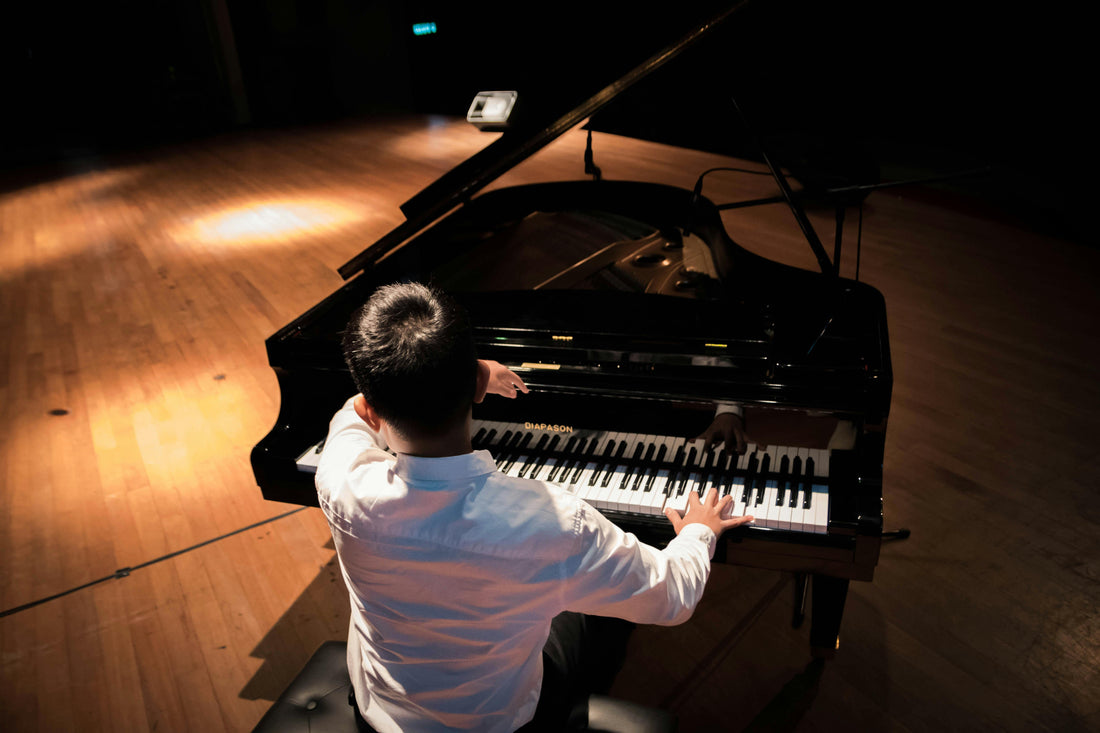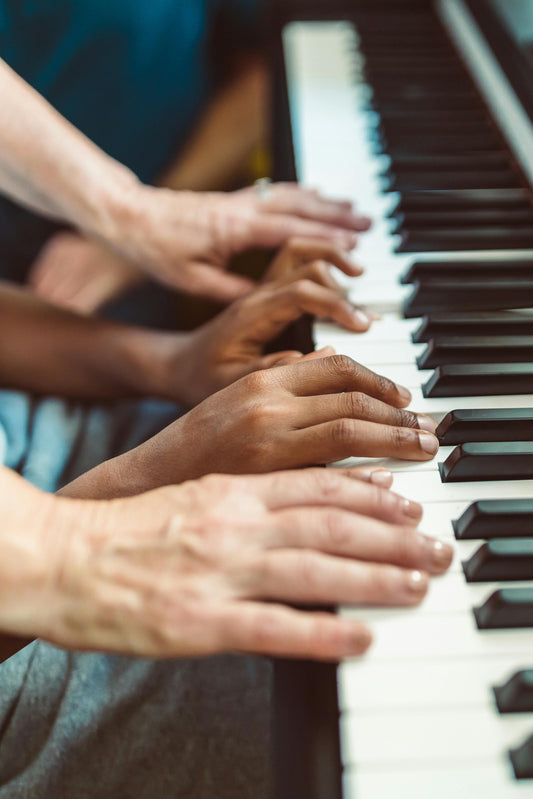
What Does Piano Education Really Cost?
Share
If you’re thinking about enrolling your child in piano lessons, you’re likely wondering about the real cost of piano education. How much will you spend, and is it truly worth it?
Piano education is an investment, and like any investment in your child, it deserves careful consideration.
We’ll walk through the typical costs you can expect, from lessons and materials to exams and instruments. Just as importantly, we’ll explain the lasting value of this investment so you can make an informed, confident decision for your family.
The Cost of Piano Lessons
Lesson fees are usually the largest part of piano education. A dedicated teacher not only helps students learn the basics but also inspires them to stay motivated and grow over time.
For young beginners, private lessons are typically the best starting point. They allow the teacher to customize lessons to your child’s pace and interests, especially during the early stages when encouragement and personal connection matter most. Here’s a general guide.
Private Lessons in the GTA:
- Beginner level (30 minutes): $25–$60 per lesson
- Intermediate level (45–60 minutes): $50–$100 or more per lesson
Most studios, including ours, bill by term rather than by lesson. This helps families plan their budgets and supports consistent learning, which is essential for progress.
Some teachers and community programs also offer group classes, priced around $15–$30 per class. While group lessons can be social and fun, private instruction usually delivers faster progress, especially for young students who benefit from personal attention.
Materials and Books
Piano education also includes materials such as lesson books, theory books, and sometimes extras like seasonal or popular music.
In the first few years of lessons, you can expect to invest in:
- Method and lesson books: $15–$30 each
- Theory workbooks: $15–$20
- Repertoire collections: $20–$40
- Fun or seasonal selections: $5–$20
Altogether, most families spend around $50–$100 per year on books and materials, especially in the early stages. Some studios help families lower costs by facilitating used book sales once students complete certain levels. This way, well-loved materials can continue to support new learners while keeping expenses manageable.
Examinations (Optional, but Valuable)
In Canada, many piano students follow the Royal Conservatory of Music (RCM) program. While exams are optional, they offer clear milestones and structured feedback that motivate students to stay engaged.
Approximate exam fees:
- Preparatory level: $75–$100
- Levels 1–4: $120–$180
- Higher levels: $200 and up
Theory exams, which begin around Level 5, generally cost about $100–$150.
For accurate, up-to-date pricing, view the official RCM fee guide: RCM Examination Fees – Canada
It’s helpful to know that not every student takes exams every year. Teachers pace exam preparation according to each child’s readiness, goals, and comfort level.
Exams help encourage regular practice and give students a wonderful sense of accomplishment as they complete each level. That said, they are one of many valuable tools.
Exams are a helpful tool for many students but not required for success. We work with families to decide what fits best.
RCM Exams Can Be Used Towards Your Ontario Secondary School Diploma
There is also an exciting academic benefit to keep in mind.
-
In Ontario, students who successfully complete Level 7 Practical and Level 7 Theory can earn a Grade 11 university or college preparation music credit toward their Ontario Secondary School Diploma (OSSD).
-
Students who complete Level 8 Practical and Level 8 Theory can earn a similar Grade 12 music credit.
You can read more about these opportunities here: RCM High School Credits – Ontario
This means your child’s musical growth can also contribute directly to their academic achievements, which many families find rewarding.
Instrument Costs
To succeed in piano, students need a quality instrument at home. Here are the common choices:
Digital Pianos
Entry-level models with weighted keys and good sound quality cost around $600–$2,000. These are excellent for beginners and save space at home. One advantage of digital pianos is that they require little to no ongoing maintenance. There’s no need for tuning, and they’re more portable if you need to rearrange your space.
Yamaha P-145 / P-225
- Entry-level portable models, excellent sound and realistic key feel.
-
Compact and budget-friendly, great for small spaces.
Yamaha Arius YDP-145 or YDP-165
- Affordable home digital piano, attractive cabinet design.
- Heavier keys, more piano-like feel compared to portable models.
- Good long-term option for beginners to intermediate levels.
Acoustic Upright Pianos
For new acoustic pianos, expect to spend $3,000–$10,000 depending on brand and quality. Many families choose to purchase a used acoustic piano, and this can be an excellent option. Well-maintained used pianos often provide great value and beautiful sound at a lower cost than buying new.
That said, it’s important to do a little homework before you buy. Some older or free pianos may need repairs or servicing to play comfortably, which can add up. Regular tuning is essential to maintain the sound quality of an acoustic piano, typically recommended every six months to a year. Standard tuning costs around $100–$200 per service, with occasional repairs adding to the lifetime care of the instrument.
To help make a confident choice, consider bringing a qualified piano technician along when viewing a used piano. They can assess the condition of the instrument, giving you peace of mind before you commit. A carefully chosen used piano can serve your child well for years. With professional advice and proper maintenance, you can find an instrument that supports healthy playing and fits your budget.
For acoustic uprights, Yamaha and Kawai are both well-known for their durability and consistent quality, especially in family homes and teaching studios.
Yamaha U1 (Used or New)
- Industry standard for upright pianos.
- Great tone, responsive touch, and excellent resale value.
- Used models are often in excellent condition and can be a smart investment.
Yamaha B-Series (B1, B2, B3)
- Yamaha’s more affordable upright series, well-suited for home practice.
- Compact design but still produces a warm, resonant sound.
Kawai K-200 or K-300
- Beautiful tone and responsive action.
- K-300 especially is a professional-level upright suitable for all levels of study.
- Known for their soft-touch keys and rich bass register.
Rental Options
Renting is a great way to begin if you’re not ready to purchase. Rentals typically cost $30–$100 per month, depending on the type of instrument and rental terms.
Whether you choose digital or acoustic, set up the piano at the correct height with an adjustable bench and foot support if needed. A good setup supports healthy posture and habits from the start.
The Time Commitment
Piano education is not only a financial investment. It also requires time and consistency.
Plan for:
- Weekly lessons: 30–60 minutes, depending on level
- Regular practice: Start with 10–15 minutes a day, increasing over time
- Recitals and events: 1–2 times per year
- Exam preparation (optional): Additional practice leading up to exams
These small, steady commitments quickly become part of your family routine and are key to making progress.
Where You Can Save and Where You Should Invest
Parents often ask where to save and where to invest in piano education.
Save on:
- Starter digital pianos: Reliable entry-level models work well for beginners.
- Used books and accessories: Ask your teacher about second-hand options.
Invest in:
- High-quality teaching: A great teacher makes the biggest difference.
- A dedicated practice space: A comfortable setup motivates regular practice.
- Enriching experiences: Recitals, festivals and challenges keep learning fresh and exciting.
Open conversations about budgeting are always welcome. We’re here to help you make smart choices for your family.
Optional Extras to Enrich Learning
Optional extras can make piano learning even more engaging and fun:
- Recital fees: $30–$60
- Camps and workshops: $150–$500
- Practice accessories: Footstools, notebooks, metronomes, fun sheet music
Students love these extra opportunities to perform, explore, and enjoy music with their peers. These experiences help students stay motivated and make music a joyful part of everyday life.
What Happens If You Take a Break?
It’s natural to wonder what happens if your child takes a break from lessons.
The good news is that musical learning stays with your child. Like reading or riding a bike, foundational skills remain and can be picked back up later.
If your child pauses lessons, they may need a brief review when returning, but their early experiences will continue to support their musical growth.
We support families through breaks and restarts. Flexible learning paths help keep music a positive part of your child’s life.
The Real Value of Piano Education
Understanding costs is important, but piano education is about far more than money. For many families, it becomes one of the most meaningful, long-term investments in their child’s development.
Research consistently shows that musical training strengthens areas of the brain tied to memory, attention, language, and executive function. Children who study piano often develop stronger working memory, improved spatial reasoning, and greater academic success in subjects like math and reading comprehension.
Beyond academics, piano lessons help children grow in ways that support their overall well-being. They learn to set goals and persevere through challenges, gaining confidence as they see their progress over time. Regular practice builds focus and problem-solving skills, as the process of learning music naturally engages both sides of the brain and encourages higher-level thinking.
Piano also offers children a way to express themselves emotionally. It helps them explore feelings and build empathy, giving them an outlet that supports emotional intelligence. As they develop their musical voice, they grow not only as students but as creative, thoughtful individuals.
With time, children build resilience. They learn that progress happens step by step and that small efforts add up to meaningful growth. Through this, they develop patience and a strong work ethic that supports success in all areas of life.
Many parents tell us that piano lessons have been one of the most rewarding investments they’ve made in their child’s development. Music becomes a lifelong companion, something their child can return to for creativity, relaxation, and personal growth throughout life.
Final Thoughts
Piano education is a valuable investment in your child’s growth and happiness. While there are costs to consider, the return extends far beyond financial numbers. With the right teacher, a thoughtful plan, and family support, piano becomes more than lessons.




